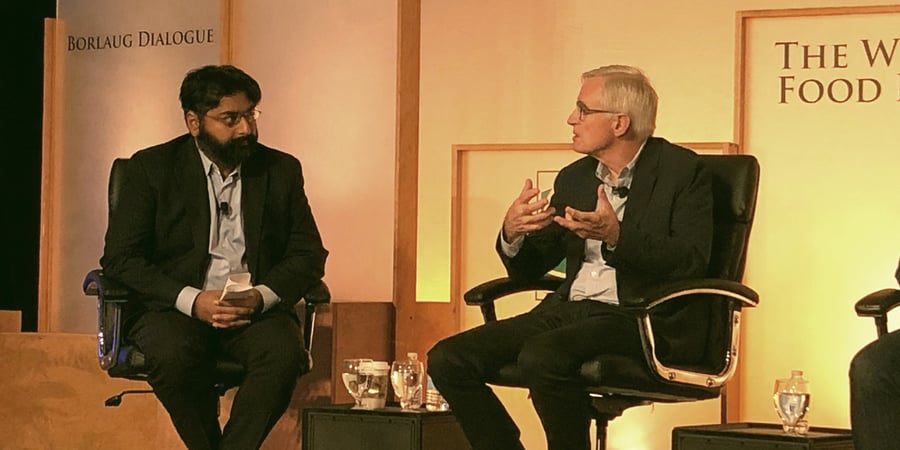4 min read
Pivot Bio at the 2019 World Food Prize
By: Richard Broglie, Ph.D. on October 30, 2019 at 1:43 PM
Rich Broglie, Chief Technology Officer, speaks with Sanjeev Krishnan of S2G Ventures at the 2019 World Food Prize.
Each fall, agricultural leaders, investors, and innovators gather in Des Moines for the The World Food Prize, just as farmers in Iowa are harvesting fields. It’s a reminder that the work of farmers is never done. The prize was established by Norman Borlaug over 30 years ago, raising the profile of the tireless work farmers and agricultural pioneers contribute to growing a world without hunger.
This year, I had the pleasure of participating in a panel on that focused on the big social impact that new technologies can have. Agriculture is at the heart of our society, and productive, sustainable agriculture impacts is the key to global challenges like hunger, climate, and stable societies. I believe innovation is the key to solving these challenges. This is especially true for agriculture, where growers are eager for new technology and tools. The capacity for innovation and start-ups to make a difference is the reason I joined a small, nimble company like Pivot Bio after a long career in the agriculture industry.
The work we’ve done so far in agriculture has brought us incredibly far. To recognize the scale of this work, we can follow the productivity of U.S. farmers across the last century and a half. From 1860 to 1940, yields remain fairly flat, hovering at around 20 bushels per acre. Then, in the 1950s, the combination of tractors, improved crop breeds, and of course, nitrogen fertilizer, resulted in the Green Revolution: a time of expansive growth in agricultural productivity. Fertilizer alone is responsible for up to 80% of this increased productivity, bringing yield per acre from 20 to 166 bushels of grain1.
As a result of the cheap, easy access to nutrients that synthetic nitrogen fertilizer offers, growers have come to rely on the product. The use of synthetic nitrogen fertilizer has increased 9-fold since 19601. Today, over 150 million metric tons of nitrogen are applied to fields each year. Fully half of it is used on just three crops - corn, wheat, and rice. The use of synthetic nitrogen has enabled impressive improvements in crop yields. It has also resulted in unintended negative consequences.
Nitrogen is pulled from the air and transformed into a reactive compound by the Haber-Bosch process. This energy intensive process consumes 3-5% of the world’s natural gas supply, equivalent to 1% of the world’s energy, and releasing 1% of the world’s greenhouse gasses. The synthetic nitrogen is indeed reactive, easily carried away by wind and water. Excess nitrogen that leaches into waterways ends up fueling algal growth that suffocates marine life. Excess nitrogen that volatilizes into the air becomes nitrous oxide, a potent greenhouse gas.
These unintended consequences have brought new challenges that require new thinking to address. At Pivot Bio, we believe that there are better ways to fertilize crops. Our technology operates at the intersection of synthetic biology and microbiome discovery and is aimed at the development nitrogen-fixing, soil microbes for cereal crops. We identify root-associated microbes and remodel them to optimize nitrogen fixation for corn. Our first commercial product, Pivot Bio PROVEN, is an in-field solution for biological nitrogen fixation that is delivered as an in-furrow application at planting.
Restoring the natural process of delivering crop nutrition is an elegant solution to the frustrating cycle of nitrogen application and loss. Borlaug envisioned it nearly 50 years ago, saying “In my dream I see green, vigorous, high-yielding fields of wheat, rice, maize, sorghums, and millets, which are obtaining, free of expense, 100 kilograms of nitrogen per hectare from nodule-forming, nitrogen-fixing bacteria.” 2 In the decades since, we’ve come to understand the intricacies of biological nitrogen fixation and developed new tools that allow us to select the best strains for the job from the billions of bacteria that live in and around the roots of crop plants. Pivot Bio is working to make this dream a reality.
The opportunity to speak at the World Food Prize is an honor. Pivot Bio is a company driven by innovators with a passionate belief in science and its potential to radically change the face of agriculture. As we work to make a difference and to develop solutions for our customers that meet the needs of the present without compromising the resources of the future, we’re pleased to be a part of the global agriculture community building a sustainable food system. The work we do is made possible by giants like Borlaug and others, and we are proud to follow in the footsteps of agriculture’s most prominent inventor.
1 Erisman J, et al, How a century of ammonia synthesis changed the world, Nature Geoscience, vol. 1, issue 10 (2008) pp. 636-639
2 Borlaug N, The Green Revolution, Peace, and Humanity, Nobel Lectures, Peace 1951-1970, Ed. Haberman F, Elsevier Publishing Company, Amsterdam, 1972

